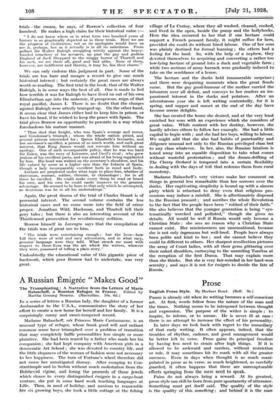A Russian Ernigree "Makes Good"
The Transplanting : A Narrative from the Letters of Marie Balascheff, a Russian Refugee in France. Edited by Martha Genung Stearns. (Macmillan. 10s. 6d.) IN a series of letters a Russian lady, the daughter of a former Ambassador to the U.S.A., communicates the story of her effort to create a new home for herself and her family. It is a surprisingly sunny and sweet-tempered record.
Madame Balascheff, nee Princess Marie Cantazuzene, is an unusual type of refugee, whose frank good will and radiant common sense have triumphed over a problem of transition that may completely baffle personalities less simple or more plaintive. She had been reared by a father who made her his companion ; she had kept company with American girls in a democratic Art School ; she was devoted to country life, and the little elegances of the woman of fashion were not necessary to her happiness. The turn of Fortune's wheel therefore did not cause her unmitigated dismay. After escaping to Con- stantinople and to Serbia without much molestation from the Bolshevist regime, and losing the proceeds of those jewels which cleave to every distinguished emigree in a cargo-boat venture, she put in some hard work teaching languages at Lille. Then, in need of holiday, and anxious to reassemble her six growing boys, she took a little cottage at the fishing village of Le Crotoy, where, they all washed, cleaned, cooked, and lived in the open, beside the pump and the hollyhocks. Here the idea occurred to her that if one hectare could support a French peasant family, it might suffice for hers, provided she could do without hired labour. One of her sons was plainly destined for formal learning ; the others had a feeling for the land. So, with the help of a nephew, they devoted themselves to acquiring and converting a rather too low-lying hectare of ground into a duck and vegetable farm ; while two sections of army barrack were gradually induced to take on the semblance of a house.
The hectare and the ducks held innumerable surprises ; and there were despairing moments when the great floods came. But the gay good-humour of the mother carried the labourers over all defeat, and conveys to her readers an im- passioned interest in the ducks and potatoes. After an adventurous year she is left writing contentedly, for it is spring, and supper and sunset at the end of the day have become serene delights.
She has created the home she desired, and at the very least enriched her sons with an experience which she considers of great value. While content with her destiny, however, she hardly advises others to follow her example. She had a little capital to begin with ; and she had her boys, willing to labour. We might add that she also had habits of punctuality and ,diligence unusual not only to the Russian privileged class but to any class whatever. In her, also, the Russian fatalism is toned away into an equable disposition to take what comes without wasteful protestation ; and the dream-drifting of The Cherry Orchard is tempered into a certain flexibility in dealing with the days of toil that redeems them from rural monotony.
Madame Balascheff's very virtues make her comment on things in general less remarkable than her sorrows over the ducks. Her captivating simplicity is bound up with a sincere piety which is reluctant to deny even that religious pro- cessions may induce a rainfall. She is affectionately disposed to the Russian peasant ; and ascribes the whole Revolution to the fact that the people have been " robbed of their faith." She also believes that the younger generation is being " sys- tematically wrecked and polluted," though she gives no details. All would be well if Russia would only become a Christian State : she sees no reason why a Christian State cannot exist. Her reminiscences are unsensational, because she is not only ingenuous but well-bred. People have always been polite and kind to her ; and she cannot believe they could be different to others. Her sharpest recollection pictures the array of Court ladies, with all their gems glittering over their naked shoulders, curtseying to the unsmiling Tsaritsa at the reception of the first Duma. That may explain more than she thinks. But she is very fair-minded in her hard-won serenity ; and says it is not for émigrés to decide the fate of Russia.




















































 Previous page
Previous page